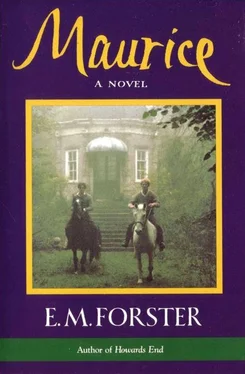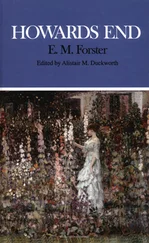His new vigour persisted next morning, when he returned to work. Before his failure with Lasker Jones he had looked forward to work as a privilege of which he was almost unworthy. It was to have rehabilitated him, so that he could hold up his head at home. But now it too crumbled, and again he wanted to laugh, and wondered why he had been taken in so long. The clientele of Messrs Hill and Hall was drawn from the middle-middle classes, whose highest desire seemed shelter — continuous shelter — not a lair in the darkness to be reached against fear, but shelter everywhere and always, until the existence of earth and sky is forgotten, shelter from poverty and disease and violence and impoliteness; and consequently from joy; God slipped this retribution in. He saw from their faces, as from the faces of his clerks and his partners, that they had never known real joy. Society had catered for them too completely. They had never struggled, and only a struggle twists sentimentality and lust together into love. Maurice would have been a good lover. He could have given and taken serious pleasure. But in these men the strands were untwisted; they were either fatuous or obscene, and in his present mood he despised the latter least. They would come to him and ask for a safe six per cent security. He would reply, "You can't combine high interest with safety — it isn't to be done"; and in the end they would say, "How would it be if I invested most of my money at four per cent, and play about with an odd hundred?" Even so did they speculate in a little vice — not in too much, lest it disorganized domesticity, but in enough to show that their virtue was sham. And until yesterday he had cringed to them.
Why should he serve such men? He began discussing the ethics of his profession, like a clever undergraduate, but the railway carriage did not take him seriously. "Young Hall's all right," remained the verdict. "Hell never lose a single client, not he." And they diagnosed a cynicism not unseemly in a business man. "All the time he's investing steadily, you bet. Remember that slum talk of his in the spring?"
43
The rain was coming down in its old fashion, tapping on a million roofs and occasionally effecting an entry. It beat down the smoke, and caused the fumes of petrol and the smell of wet clothes to linger mixed on the streets of London. In the great forecourt of the Museum it could fall uninterruptedly, plumb onto the draggled doves and the helmets of the police. So dark was the afternoon that some of the lights had been turned on inside, and the great building suggested a tomb, miraculously illuminated by spirits of the dead.
Alec arrived first, dressed no longer in corduroys but in a new blue suit and bowler hat — part of his outfit for the Argentine. He sprang, as he had boasted, of a respectable family — publicans, small tradesmen — and it was only by accident that he had appeared as an untamed son of the woods. Indeed, he liked the woods and the fresh air and water, he liked them better than anything and he liked to protect or destroy life, but woods contain no "openings", and young men who want to get on must leave them. He was determined in a blind way to get on now. Fate had placed a snare in his hands, and he meant to set it. He tramped over the courtyard, then took the steps in a series of springs; having won the shelter of the portico he stood motionless, except for the flicker of his eyes. These sudden changes of pace were typical of the man, who always advanced as a skirmisher, was always "on the spot" as Clive had phrased it in the written testimonial; "during the five months A. Scudder was in my service I found him prompt and assiduous": qualities that he proposed to display now. When the victim drove up he became half cruel, half frightened. Gentlemen he knew, mates he knew; what class of creature was Mr Hall who said, "Call me Maurice"? Narrowing his eyes to slits, he stood as though waiting for orders outside the front porch at Penge.
Maurice approached the most dangerous day of his life without any plan at all, yet something kept rippling in his mind like muscles beneath a healthy skin. He was not supported by pride but he did feel fit, anxious to play the game, and, as an Englishman should, hoped that his opponent felt fit too. He wanted to be decent, he wasn't afraid. When he saw Alec's face glowing through the dirty air his own tingled slightly, and he determined not to strike until he was struck.
"Here you are," he said, raising a pair of gloves to his hat. "This rain's the limit. Let's have a talk inside."
"Where you wish."
Maurice looked at him with some friendliness, and they entered the building. As they did so, Alec raised his head and sneezed like a lion.
"Got a chill? It's the weather."
"What's all this place?" he asked.
"Old things belonging to the nation." They paused in the corridor of Roman emperors. "Yes, it's bad weather. There've only been two fine days. And one fine night," he added mischievously, surprising himself.
But Alec didn't catch on. It wasn't the opening he wanted. He was waiting for signs of fear, that the menial in him might strike. He pretended not to understand the allusion, and sneezed again. The roar echoed down vestibules, and his face, convulsed and distorted, took a sudden appearance of hunger.
"I'm glad you wrote to me the second time. I liked both your letters. I'm not offended — you've never done anything wrong. It's all your mistake about cricket and the rest. I'll tell you straight out I enjoyed being with you, if that's the trouble. Is it? I want you to tell me. I just don't know."
"What's here? That's no mistake." He touched his breast pocket, meaningly. "Your writing. And you and the squire — that's no mistake — some may wish as it was one."
"Don't drag in that," said Maurice, but without indignation, and it struck him as odd that he had none, and that even the Clive of Cambridge had lost sanctity.
"Mr Hall — you reckernize it wouldn't very well suit you if certain things came out, I suppose."
Maurice found himself trying to get underneath the words.
He continued, feeling his way to a grip. "What's more, I've always been a respectable young fellow until you called me into your room to amuse yourself. It don't hardly seem fair that a gentleman should drag you down. At least that's how my brother sees it." He faltered as he spoke these last words. "My brother's waiting outside now as a matter of fact. He wanted to come and speak to you hisself, he's been scolding me shocking, but I said, 'No Fred no, Mr Hall's a gentleman and can be trusted to behave like one, so you leave 'im to me, I said, 'and Mr Durham, he's a gentleman too, always was and always will be. "
"With regard to Mr Durham," said Maurice, feeling inclined to speak on this point: "It's quite correct that I cared for him and he for me once, but he changed, and now he doesn't care any more for me nor I for him. It's the end."
"End o' what?"
"Of our friendship."
"Mr Hall, have you heard what I was saying?"
"I hear everything you say," said Maurice thoughtfully, and continued in exactly the same tone: "Scudder, why do you think it's 'natural' to care both for women and men? You wrote so in your letter. It isn't natural for me. I have really got to think that 'natural' only means oneself."
The man seemed interested. "Couldn't you get a kid of your own, then?" he asked, roughening.
"I've been to two doctors about it. Neither were any good."
"So you can't?"
"No, I can't."
"Want one?" he asked, as if hostile.
"It's not much use wanting."
"I could marry tomorrow if I like," he bragged. While speaking, he caught sight of a winged Assyrian bull, and his expression altered into naive wonder. "He's big enough, isn't he," he remarked. "They must have owned wonderful machinery to make a thing like that."
Читать дальше












